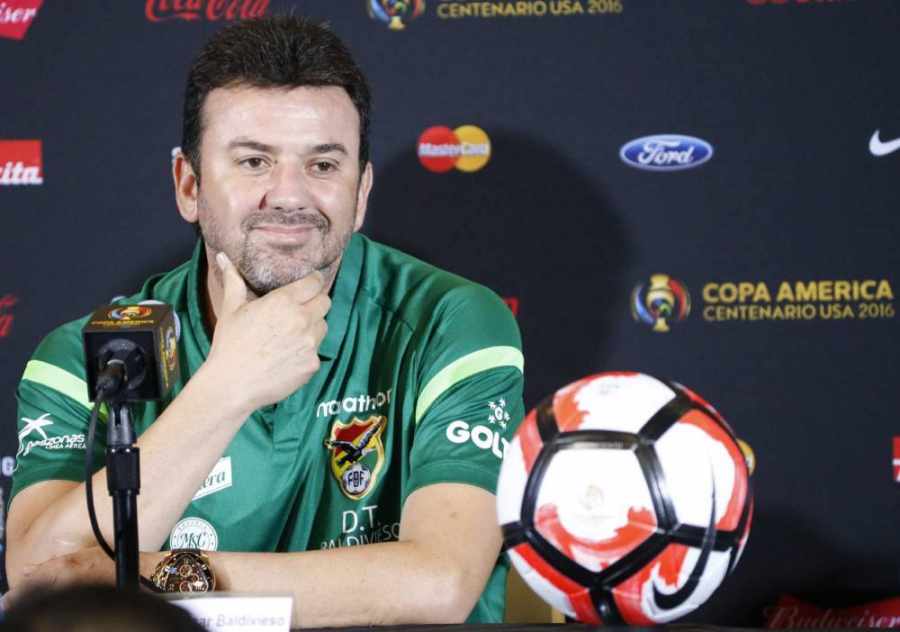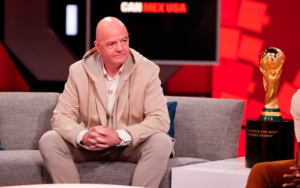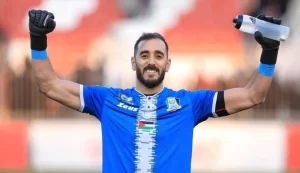 |
| Badlivieso faces the press after going 0-0-3 in Copa America Centenario 2016 |
News broke yesterday, that Palestine has signed a contract with Bolivian manager Julio Cesar Baldivieso. While the details of the agreement are not clear, it was announced that Turki Al-Sheikh in his role as President of the Islamic Solidarity Sports Federation, will finance the deal by paying $1 Million USD to pay for Baldivieso’s contract as well as the contract of his staff.
The information was disseminated vis-a-vis the official twitter account of the General Sports Association of Saudi Arabia. A body that is also headed by Turki Al-Sheikh and one that is also responsible for football in the kingdom.
At the moment of writing, Football Palestine, can confirm that no communication from the PFA has been made to Abdel Nasser Barakat in regards to his status (edit: Barakat has indeed been let go as manager). Earlier this year, the Palestinian tactician successfully guided Palestine to the 2019 AFC Asian Cup finals and to their best ever FIFA ranking. He has won his last six competitive games in charge of the national team and holds the record for best goals scored average, best goals allowed average, winning percentage, points per game, as well as the longest undefeated streak in the history of the national team.
Baldivieso’s has no coaching experience outside of South American and his only stint as a national team manager- yielded Bolivia 10 losses in 11 matches.
A fantastic player
Julio Cesar Baldivieso manager is perhaps better known for his playing career, as he is one of the finest footballers Bolivia ever produced- alongside the likes of Marco Etcheverry and Erwin Sanchez.
As a player, he made his professional debut at just 15 years old and was a key part of the side that won the 1994 World Cup and the side that finished Runners Up at the 1997 Copa America.
He would later go on to play nearly 47 Copa Libertadores games with the likes of Wilsterman, Bolivar, and Cobreloa of Chile.
His career also featured playing stints in Asia and the Middle East with Yokohama Marinos, Riyadh giants Al-Nasr, and Qatari side Al-Wakrah.
He hung up his boots in 2008, having amassed 85 caps and 15 goals for the Bolivian national team over a 14 year period and playing in the top divisions of Bolivia, Argentina, Chile, Ecuador, Venezuela, Japan, Qatar, and Saudi Arabia.
A connection to Palestine
El Emperador as he is known in his native Bolivia played on the same Cobreloa team that featured El Rockero Pablo Abdala. The two formed a good partnership in midfield with Abdala breaking up opposition play and Baldivieso free to set up attacks.
The pair led Cobreloa to the knockout stages of the 2001 Copa Libertadores where the fell to eventual semifinalists Rosario Central.
German Education
Baldivieso holds a Fussballherrer license from the Deutsche Fusball Bund (German FA). It’s a license held by many who managed in the Bundesliga including, but not limited to, Felix Magath and Jürgen Klopp.
First Title
As a manager, Baldivieso stepped off the playing pitch and into the technical area with Aurora and had immediate success, winning the Torneo de Clausura and qualifying for the 2009 Copa Libertadores- where they lost all six games in the group stage.
This remains the only time Aurora has won a trophy.
Charges of Nepotism
In 2009, he handed his son Mauricio Baldivieso his first cap. This made the younger Baldivieso the youngest player to ever feature in a professional first division match- his son came on for the final eight minutes of a league match aged 12 years, 11 months, and 23 days.
He was forced to resign after lashing out at opposition players and the referee over conduct towards his son.
Three years later the duo were back at Aurora but there was still plenty of drama with the older Baldivieso filmed kicking his son as they went into the dressing rooms at halftime.
Journeyman
 |
| Baldivieso’s club record |
The 46 year old has coached five other clubs in the Bolivian top flight: Real Potosí, Nacional Potosí, Universitario de Sucre, Club San José, and Wilsterman. His most recent coaching stint was with Carabobo of the Venezuelan Primera.
Sudamericana & Copa Libertadores Success
Two additional stints at Aurora gave him his first taste of continental football. He successfully led the tiny club past the first stage of the Copa Sudamericana in 2011 and 2012. With a stint spent at Real Potosí in between the two campaigns.
He was unable to repeat that feat however as head coach of Wilstermann in 2014.
His career highlight is without a doubt leading Universitario out of their group in the 2015 Copa Libertadores. They pushed Liga MX giants Tigres UANL to the brink before eventually losing 3-2 on aggregate in the Round of 16.
Short term specialist
 |
| Baldivieso’s cup record is solid if uninspiring. |
Baldivieso has had a good and varied experience but is something of a short term specialist. With his average tenure lasting only 215 days. He tends to take over clubs that have found themselves dealing with continental football in addition to their domestic duties and is charged with helping manage both.
He has only qualified one team to continental football- Aurora in 2008. He was at the helm again in 2011 but left before the season was over, only to return the next season to guide them at the Copa Sudamericana for the second year running.
In 43 tournament games with the clubs he has managed he has a loss percentage of 46.5% and is usually good for at least one playoff round win.
Baldivieso’s contract with the Palestine FA is rumored to be up after the 2019 AFC Asian Cup.
Bolivia Manager
Baldivieso was handed the top job in his native Bolivia just before the start of 2018 World Cup qualification. He recorded his first and only win in his third competitive match at the helm- a 4-2 victory over Venezuela.
That result put Bolivia above eventual finalists Peru and Argentina in the table but was followed by a string of three losses.
In his nine competitive fixtures with Bolivia- his sides gave up points in the final 10 minutes on four different occasions.
Those losses including giving up two game winning goals at the Copa America to Panama and Chile (with some controversy as to the latter) as well as capitulations to Ecuador and Colombia during World Cup qualifying.
Move to Venezuela
In his time as Bolivia manager, the former midfielder lost all his games except for one- a 4-2 victory over fellow strugglers Venezuela.
That victory, combined with a brief stint in Venezuela as a player, helped facilitate his final move. He led the side to a first place finish in the Apertura table and a third place in the Clausura table which left Carabobo as the top ranked side in the aggregate table.
In the tournaments, Carabobo were semifinalists in both the Apertura and Clausura playoffs. He also guided the side to the quarterfinals of the Venezuelan Cup but could not replicate his continental success- crashing out at the preliminary stages of Copa Libertadores qualifying by a 3-0 scoreline at the hands of FC Junior of Colombia.




